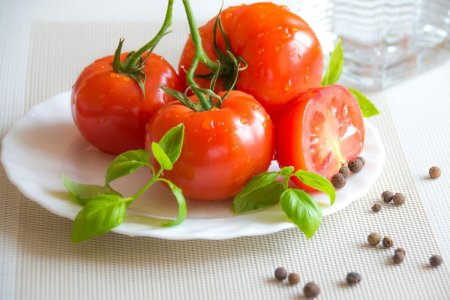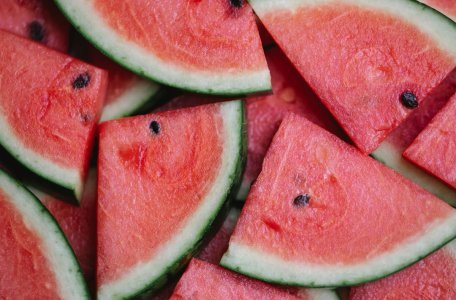The surprising depression cure hiding in your fruit bowl—but there’s a catch
By
Aubrey Razon
- Replies 0
Disclaimer: The information provided in this article is for educational purposes only and is not intended as a substitute for professional medical advice, diagnosis, or treatment. Always consult your physician or other qualified healthcare providers with any questions you may have regarding a medical condition or before making any changes to your health regimen.
Could the secret to beating the blues be hiding in your fruit bowl? Scientists have uncovered a surprising link between certain colorful foods and mood-boosting benefits.
But is it really the cure we’ve been waiting for?
Recent research suggests that lycopene, the pigment that paints tomatoes and watermelons their signature red, could play a role in easing symptoms of depression.
But before you start piling your plate high with these ruby delights, let's peel back the layers of this fascinating find.
Lycopene is not just about making fruits and veggies look pretty. This natural plant extract has caught the attention of scientists for its potential to enhance brain cell communication.

Researchers from Chongqing Medical University in China have delved into the neuroprotective effects of plant extracts, with lycopene shining brightly due to its potent antioxidant properties and accessibility.
Their study, published in the journal Food Science & Nutrition, involved inducing depressive-like behaviors in 60 mice.
These furry subjects were then split into two groups: one received a lycopene supplement, while the other was given a corn oil placebo.
The results were intriguing—the lycopene group showed increased socialization and a greater interest in activities that typically bring joy to mice.
It appears that lycopene may help restore synaptic plasticity, the brain's ability to learn, remember, and adapt.
This is crucial since depression can impair these very mechanisms.
The researchers pinpointed a specific signaling pathway in the nervous system that lycopene seems to influence, potentially reversing depressive behavior.
However, the study isn't without its caveats.

For starters, only male mice were used, and the focus was on the hippocampus, a brain region tied to learning and memory.
Depression is a complex beast, and its mechanisms are not fully understood.
The researchers themselves suggest that longer observation periods post-lycopene intervention could yield a more comprehensive understanding of its effects.
And then there's the matter of dosage.
The mice were given 20 milligrams of lycopene per kilogram of body weight. To translate that into human terms, a 200-pound individual would need about 147 milligrams of lycopene daily.
That's a lot of tomatoes!
If you're curious about boosting your lycopene intake, here's where you can find this vibrant pigment:
It's a tempting thought, especially for those of us who prefer natural remedies.
But it's important to remember that depression is a multifaceted condition, and what works for one person may not work for another.

Moreover, the amount of lycopene required for a potential therapeutic effect is quite high when considering the concentrations found in common foods.
As we age, maintaining mental health becomes increasingly important.
At The GrayVine, we're always on the lookout for ways to support our well-being, and diet is a key piece of that puzzle.
While lycopene's role in mental health is still being explored, its benefits as an antioxidant are well-established. Including a variety of colorful fruits and vegetables in our diets is a wise choice for overall health.
Before making any significant changes to your diet or treatment plan, it's crucial to consult with a healthcare professional.
And remember, while the promise of a natural cure for depression is alluring, it's essential to approach such findings with a balanced perspective.
 Have you experienced mood improvements with dietary changes? Are there any natural remedies you swear by for mental wellness? Share your insights and join the conversation below.
Have you experienced mood improvements with dietary changes? Are there any natural remedies you swear by for mental wellness? Share your insights and join the conversation below.
Could the secret to beating the blues be hiding in your fruit bowl? Scientists have uncovered a surprising link between certain colorful foods and mood-boosting benefits.
But is it really the cure we’ve been waiting for?
Recent research suggests that lycopene, the pigment that paints tomatoes and watermelons their signature red, could play a role in easing symptoms of depression.
But before you start piling your plate high with these ruby delights, let's peel back the layers of this fascinating find.
Lycopene is not just about making fruits and veggies look pretty. This natural plant extract has caught the attention of scientists for its potential to enhance brain cell communication.

The amount of lycopene required for a therapeutic effect in humans could be substantial. Image source: AS Photography/Pexels.
Researchers from Chongqing Medical University in China have delved into the neuroprotective effects of plant extracts, with lycopene shining brightly due to its potent antioxidant properties and accessibility.
Their study, published in the journal Food Science & Nutrition, involved inducing depressive-like behaviors in 60 mice.
These furry subjects were then split into two groups: one received a lycopene supplement, while the other was given a corn oil placebo.
The results were intriguing—the lycopene group showed increased socialization and a greater interest in activities that typically bring joy to mice.
It appears that lycopene may help restore synaptic plasticity, the brain's ability to learn, remember, and adapt.
This is crucial since depression can impair these very mechanisms.
The researchers pinpointed a specific signaling pathway in the nervous system that lycopene seems to influence, potentially reversing depressive behavior.
However, the study isn't without its caveats.

In a study, mice treated with lycopene showed improved social interaction and interest in activities. Image source: Engin Akyurt/Pexels.
For starters, only male mice were used, and the focus was on the hippocampus, a brain region tied to learning and memory.
Depression is a complex beast, and its mechanisms are not fully understood.
The researchers themselves suggest that longer observation periods post-lycopene intervention could yield a more comprehensive understanding of its effects.
And then there's the matter of dosage.
The mice were given 20 milligrams of lycopene per kilogram of body weight. To translate that into human terms, a 200-pound individual would need about 147 milligrams of lycopene daily.
That's a lot of tomatoes!
If you're curious about boosting your lycopene intake, here's where you can find this vibrant pigment:
- Sun-dried tomatoes are the lycopene champions, with 45.9 milligrams per 100 grams.
- Fresh tomatoes offer a more modest 4 to 10 milligrams per 130-gram serving.
- Ketchup provides a quick fix with 3.3 milligrams per tablespoon.
- Tomato paste is a concentrated source, with about 16 milligrams per 100 grams.
- Watermelon slices come with 4.5 milligrams per 100 grams.
- Papaya adds a tropical twist with 1.8 milligrams per 100 grams.
- Pink grapefruit rounds out the list with 1.1 milligrams per 100 grams.
It's a tempting thought, especially for those of us who prefer natural remedies.
But it's important to remember that depression is a multifaceted condition, and what works for one person may not work for another.

The research highlighted lycopene's potential neuroprotective effects. Image source: Any Lane/Pexels.
Moreover, the amount of lycopene required for a potential therapeutic effect is quite high when considering the concentrations found in common foods.
As we age, maintaining mental health becomes increasingly important.
At The GrayVine, we're always on the lookout for ways to support our well-being, and diet is a key piece of that puzzle.
While lycopene's role in mental health is still being explored, its benefits as an antioxidant are well-established. Including a variety of colorful fruits and vegetables in our diets is a wise choice for overall health.
Before making any significant changes to your diet or treatment plan, it's crucial to consult with a healthcare professional.
And remember, while the promise of a natural cure for depression is alluring, it's essential to approach such findings with a balanced perspective.
Key Takeaways
- Lycopene, a pigment found in certain red and pink fruits and vegetables, could alleviate depression symptoms by enhancing brain cell communication.
- In a study, mice treated with lycopene showed improved social interaction and interest in activities, indicating reduced depression-like behavior.
- The research highlighted lycopene's potential neuroprotective effects and restoration of synaptic plasticity, but was limited to male mice and focused on the hippocampus.
- The amount of lycopene required for a therapeutic effect in humans could be substantial, with food sources like sun-dried tomatoes, watermelons, and papayas containing varying concentrations of the compound.





